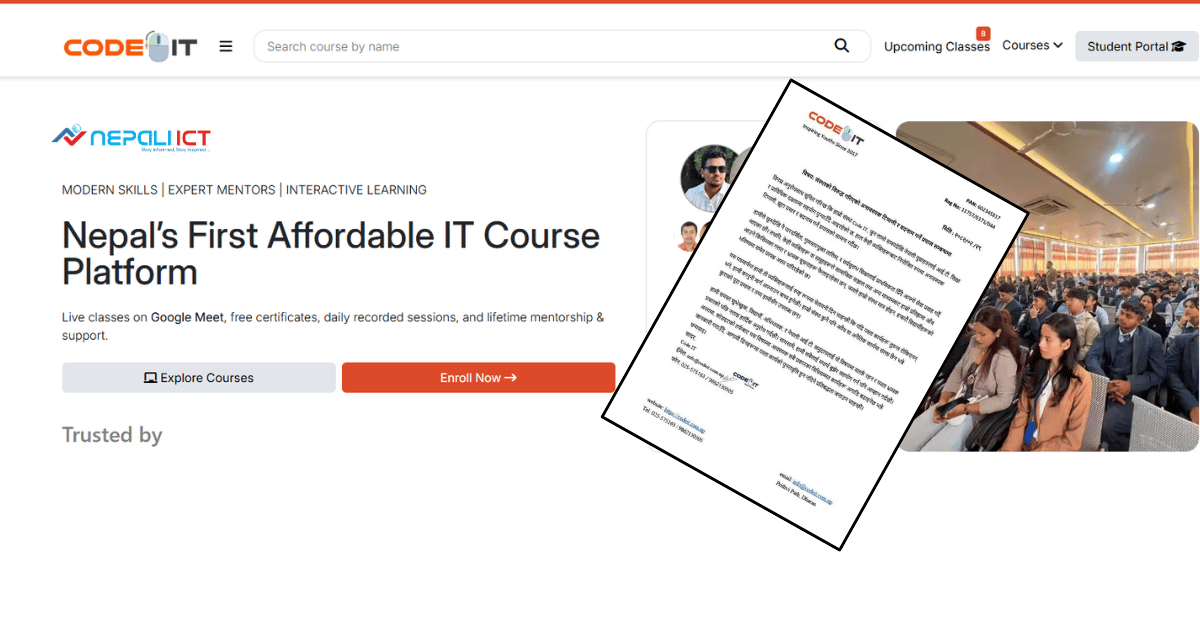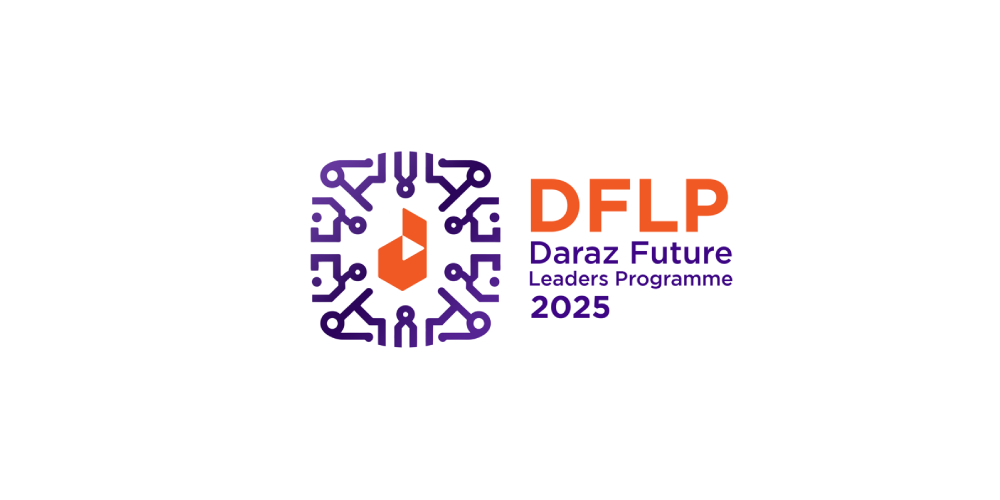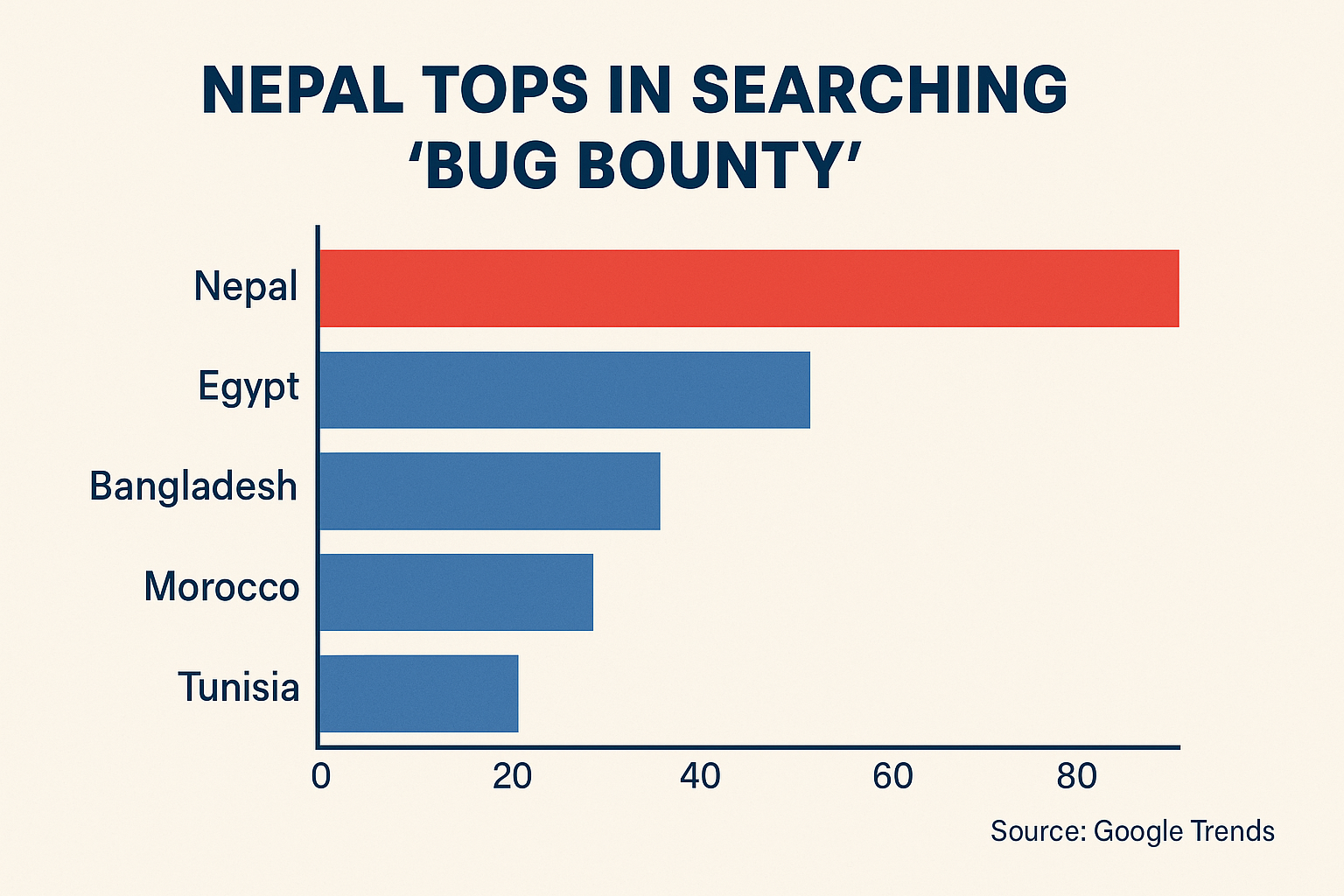Kathmandu-In an unprecedented surge of interest, Nepal has emerged as the global leader in online searches for the term “bug bounty” over the past year. According to Google Trends, Nepal scored a perfect 100 in search interest, leaving behind countries like Egypt, Bangladesh, and Morocco. This remarkable spike reflects a broader digital transformation among Nepal’s youth, who are increasingly drawn toward cybersecurity, ethical hacking, and digital self-reliance.
What is Bug Bounty and Why is Nepal Hooked?
Bug bounty programs are incentive-based initiatives where companies reward ethical hackers for identifying security vulnerabilities in their digital systems, websites, or applications. Industry giants such as Google, Facebook, Microsoft, and Meta have long relied on these programs to strengthen their cybersecurity defenses.
For Nepal’s youth—many of whom are self-taught and eager to compete globally—bug bounty hunting offers a unique blend of learning, recognition, and financial reward. Unlike traditional jobs, bug bounty programs provide a level playing field with no gatekeeping; anyone with the right skills can participate and earn.
The Spark: How Nepal’s Bug Bounty Movement Began
The recent surge in Nepal’s bug bounty interest was notably ignited by a social media post from an X (formerly Twitter) user ‘sw33tLie,’ who shared insights about bug bounty programs. This post quickly went viral within Nepal’s cybersecurity circles, inspiring thousands to explore this new domain.
Since then, the community has grown exponentially, with many young Nepalis dedicating themselves to ethical hacking, motivated by success stories and the promise of lucrative rewards.
Nepal’s Bug Hunters: Real Stories, Real Success
Bug bounty hunting in Nepal is not just a hobby; it has become a viable profession for many. Facebook’s bug bounty platform, WhiteHat, is particularly popular among Nepali hunters. Many have reported bugs on platforms like Facebook, Google, Amazon, Microsoft, and even prestigious institutions like Oxford University.
For example, cybersecurity researcher Saugat Pokharel recently earned over $13,000 for discovering a privacy-related bug on Instagram that exposed users’ birthdates and email addresses. Another researcher earned over $100,000 in cash rewards over 18 months of dedicated bug hunting.
These successes have inspired a new generation. Management student Prabha Basnet, after initial rejections, earned $3,000 from Facebook and Instagram bug reports, motivating her to continue in this field.
The Growing Cybersecurity Market in Nepal
Nepal’s cybersecurity market is booming. According to Statista, the market revenue is projected to reach over $34 million in 2025, with an annual growth rate exceeding 16% expected through 2029. This growth is fueled by increasing internet penetration, digital transformation, and rising cyber threats.
Nepal’s Information Security Response Team (NISRT) reported a 67% increase in cyber incidents over the past year, highlighting the urgent need for stronger cybersecurity measures. This environment creates ample opportunities for ethical hackers and bug bounty hunters to contribute meaningfully.
Bug Bounty: A Pathway from Curiosity to Career
Experts like Naresh Lamgade, a leading cybersecurity researcher, see bug bounty hunting as more than just a side gig. “It’s a stepping stone to a professional career,” he says. “You build a portfolio, gain real-world experience, and get noticed by companies.”
Many young Nepalis are shifting their career aspirations from traditional IT roles like programming or design to cybersecurity research. The appeal lies in the global nature of bug bounty programs, where talent is recognized regardless of geography.
Ethical Hacking: Changing Perceptions in Nepal
The term “hacker” once carried negative connotations in Nepal, often associated with illegal activities. However, thanks to media coverage and success stories, ethical hacking and bug bounty hunting are now seen as honorable and lucrative skills.
Cybersecurity expert Saugat Pokharel credits Nepali media for this shift. “Positive coverage has inspired many to view ethical hacking as a legitimate and rewarding career,” he notes.
Challenges and Caveats in Nepal’s Bug Bounty Scene
Despite the excitement, experts caution that bug bounty hunting is not an easy path. It requires deep technical knowledge, patience, and resilience. Many beginners face frustration due to rejected reports or duplicate findings.
Nirmal Dahal, head of security at Cryptogen Nepal, warns that many youths are attracted by the money but lack a proper understanding of cybersecurity fundamentals. “Bug bounty is not just about quick money; it demands ethical responsibility and continuous learning,” he says.
There are also legal risks. Some beginners attempt to hack unauthorized sites, including government portals without permission, which is illegal and can lead to serious consequences. Experts recommend practicing on legal platforms like TryHackMe, HackTheBox, and PortSwigger before moving to real-world bug bounty programs.
Nepal’s First Local Bug Bounty Platform: BugV
Recognizing the growing interest, Nepal recently launched its first homegrown bug bounty platform, BugV. Developed by Cynical Technology Pvt. Ltd., BugV aims to connect Nepali companies with local ethical hackers, fostering a safer digital ecosystem within the country.
This local platform is a significant step toward encouraging Nepal-based organizations to adopt bug bounty programs and improve their cybersecurity posture.
The Role of Bug Bounty in Strengthening Nepal’s Cybersecurity
Nepal’s cybersecurity infrastructure has historically been weak, with frequent hacking incidents affecting government and private sector websites. Bug bounty hunters act as a critical defense line, identifying vulnerabilities before malicious hackers can exploit them.
According to Pokharel, “Bug hunting helps prevent data leaks and privacy breaches. It’s a firewall against black hat hackers.”
Some Nepali companies have started recognizing this potential, offering rewards and appreciation to ethical hackers who report bugs. However, widespread adoption of bug bounty programs among Nepalese firms remains limited.
The Economic Impact: Bug Bounty as a Source of Income
For many Nepali youths, bug bounty hunting is more than a passion—it’s a source of income. During the COVID-19 lockdowns, many students and young professionals found themselves with extra time and turned to bug bounty hunting as a productive outlet.
Medical student Niva Shah, for instance, earned $1,000 from Facebook within a week after reporting a valid bug. Such stories have motivated many others to explore bug bounty hunting seriously.
Building a Sustainable Bug Bounty Ecosystem in Nepal
To sustain this momentum, experts emphasize the need for:
-
Education and Training: More workshops, bootcamps, and online courses tailored to Nepal’s context.
-
Community Building: Forums and groups where ethical hackers can share knowledge and collaborate.
-
Corporate Engagement: Encouraging Nepali companies to launch bug bounty programs and reward ethical hackers.
-
Legal Frameworks: Clear laws that support ethical hacking and protect bug bounty hunters from legal risks.
Nepal’s Digital Future
Nepal’s rise as a global leader in bug bounty searches is more than a trend—it’s a digital revolution driven by curiosity, skill, and opportunity. As more youths embrace ethical hacking, supported by growing platforms and success stories, Nepal is poised to become a recognized cybersecurity powerhouse.
With continued learning, ethical practices, and institutional support, Nepal’s bug bounty hunters can not only secure the digital world but also build rewarding careers and contribute to the nation’s economic growth.
Bug bounty is no longer just a buzzword in Nepal—it’s the new frontier for tech-savvy youth ready to make their mark on the global stage.






















Comments